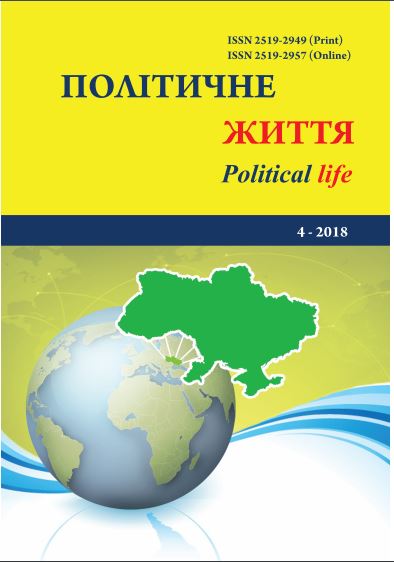Ukrainian political science under feminization: the struggle “pro” and “contra” the patriarchal episteme.
DOI:
https://doi.org/10.31558/2519-2949.2018.4.7Keywords:
gender, political science, patriarchal episteme, feminizationAbstract
The article is devoted to the gender dimension of political science in modern Ukraine. The empirical base is 1687 posts about the defence of the Ph.D. and doctoral theses in political science, as well as 35 interviews with professors and associate professors from Kharkiv, Lviv and Simferopol.
Male/female applicants have been divided into two groups: applicants from the Academy and outside it. In the first group feminization of modern Ukrainian political science at the Ph.D. level and masculinization at the doctoral level is revealed. In the second group masculinization is found out at the both levels of science. The reason for the simultaneous feminization of the “education / science system” and / or the masculinization “outside the education system / science” is that gender reflects the general structure of power in society. Male and female applicants from outside the Academy, ranging from ministers to prosecutors, add to it the power and property hierarchies that are more common to other areas of social and political life in Ukraine. As a result of the patriarchy of Ukrainian society the number of male applicants is increasing and the number of female applicants is decreasing. Such a transfer involves the commercialization of “legitimate” academic relationships and the adoption of a new hybrid system of scientific gender selection.
The second part of the article deals with autobiographical narratives of the professors and associate professors in three Ukrainian political science communities. The dominant gender regime in the profession of political science is reconstructed and its perception by male and female practitioners is described. There are two main indicators of gender (in)equality in the profession: 1) the prevalence of diametrically opposed thoughts about discrimination, and 2) the tendency to direct distortion the (objective) facts. According to my hypothesis feminization of Ukrainian political science is not accompanied by the deconstruction of the patriarchal episteme. In particular, the female political scientists’ awareness of their own importance is formulated in the categories of gender stereotypes and evaluated in terms of establishing hegemony through the development of gender roles being traditionally considered as the “male” ones.
References
Barinaga M. Overview: Surprises across the Cultural Divide / Marcia Barinaga // Science. – 1994. – Vol. 263. March 11. – Pp. 1468–1474.
Belafatti F. Orientalism Reanimated: Colonial Thinking in Western Analysts’ Comments on Ukraine [Електронний ресурс] / Fabio Belafatti // Режим доступу: http://euromaidanpress.com/2014/10/ 27/ westerncommentators-should-rid-themselves-of-old-prejudices-dating-back-from-the-age-of-colonialism-before-commentingon-eastern-european-affairs/
Dreijmanis J. Political Science: A Precarious Vocation / John Dreijmanis // Teaching Political Science. – 1981. – Vol. 8. No. 4. – P. 475–485.
Fox M. F. Gender, Hierarchy, and Science / Mary F. Fox // Janet S. Chafetz (Ed.). Handbook of the Sociology of Gender. – New York, 2006. – Pp. 441–458.
Jaschik S. Women Lead in Doctorates [Електронний ресурс] / Scott Jaschik // Inside Higher Education. – 2010. – September 14. Режим доступу: https://www.timeshighereducation.com/news/inside-higher-ed-women-leadin-doctorates/413522.article
Malyarenko T. Universities under fire in Ukraine’s war / Tatyana Malyarenko // Index on Censorship. – 2015. – Volume 44, issue: 2. Р. 14-17.
Rothman S, Kelly-Woessner A., Woessner M. The Still Divided Academy: How Competing Visions of Power, Politics, and Diversity Complicate the Mission of Higher Education / Stanley Rothman, April Kelly-Woessner, Matthew Woessner. – Lanham, MD, 2011. – 282 р.
Shapin St. The Scientific Life. A Moral History of a Late Modern Vocation / Steven Shapin. – Chicago, 2008. – 468 р.
Shevel O. Ukrainian Political Science and the Study of Ukraine within American Political Science: How Similar, How Different? / Oxana Shevel // Journal of Ukrainian Politics and Society. – 2015. – Р. 23–32.
Svyrydenko1 D. Divided Universities: The Postcolonial Experience of Contemporary Ukrainian Higher Education/ Denys Svyrydenko // Future Human Image. – 2017. – Volume 7. – Р. 128–135.
Whitley, R. The Intellectual and Social Organization of the Sciences / Richard Whitley. – Oxford University Press, 2000. – 320 р.
Zayarnyuk, A. A Revolution’s History, A Historians’ War / Andriy Zayarnyuk // Ab Imperio. – 2015. – №1. – Р. 449–479.
Браун К., Штефан І. Гендер і знання / Крістіна фон Браун, Інґе Штефан // Образ. Тіло. Порядок. Гендерні дослідження в міждисциплінарному спектрі. – Київ: Медуза, 2014. – С. 9–39.
Воровка М., Петрученя А. Гендерный состав научно-педагогических кадров Украины как элемент скрытого учебного плана высшей школы / М. Воровка, А. Петрученя // Наукові записки Національного університету «Острозька академія». Серія «Гендерні дослідження». – 2015. – Вип. 1. – С. 27–37.
Куделя С. Чи можлива в Україні політична наука? / Сергій Куделя // Критика. – 2012. – № 1–2. – С. 24–25.
Мацієвський Ю. Чому в нас немає політичної науки / Юрій Мацієвський // Критика. – 2012. – № 6. – С. 10–12.
Осін В. Між науковістю та престижем: руйнуючи соціальний міф про корумпованість «ліриків» [Електронний ресурс] / Вадим Осін // Україна модерна. Міжнародний інтелектуальний часопис. – 2018, червень. Режим доступу: http://uamoderna.com/blogy/osin/osin-prestige-and-science
Старіш О. Політична наука в Україні: 20 років незалежности / О. Старіш // Критика. – 2012. – № 9– 10. – С. 27–29.

